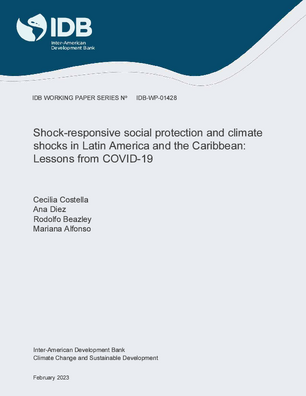Shock-responsive social protection and climate shocks in Latin America and the Caribbean: Lessons from COVID-19
Date
Feb 2023
Latin America and the Caribbean (LAC) is one of the regions most exposed and vulnerable to climate-related risks, with large shocks occurring regularly. Climate change is exacerbating the frequency and variability of climate related extremes and increasing slow onset events, threatening social and economic outcomes in the region.
Responding to climate change will require stronger risk management systems that include social protection. Social protection systems in LAC are relatively advanced, but they do not yet consider climate shocks. Overall, social protection systems suffer from relatively low coverage, leaving significant parts of the population vulnerable to transient and chronic poverty in the face of shocks. The large social protection responses that LAC implemented to address the impacts of COVID-19 present an opportunity to prepare for the challenges arising from increased climate-related shocks. This study investigates how non-contributory social protection (mainly income support) has been used to respond to previous climate-related shocks and to COVID-19, and what are the implications for managing climate-related shocks in the future.
Responding to climate change will require stronger risk management systems that include social protection. Social protection systems in LAC are relatively advanced, but they do not yet consider climate shocks. Overall, social protection systems suffer from relatively low coverage, leaving significant parts of the population vulnerable to transient and chronic poverty in the face of shocks. The large social protection responses that LAC implemented to address the impacts of COVID-19 present an opportunity to prepare for the challenges arising from increased climate-related shocks. This study investigates how non-contributory social protection (mainly income support) has been used to respond to previous climate-related shocks and to COVID-19, and what are the implications for managing climate-related shocks in the future.




